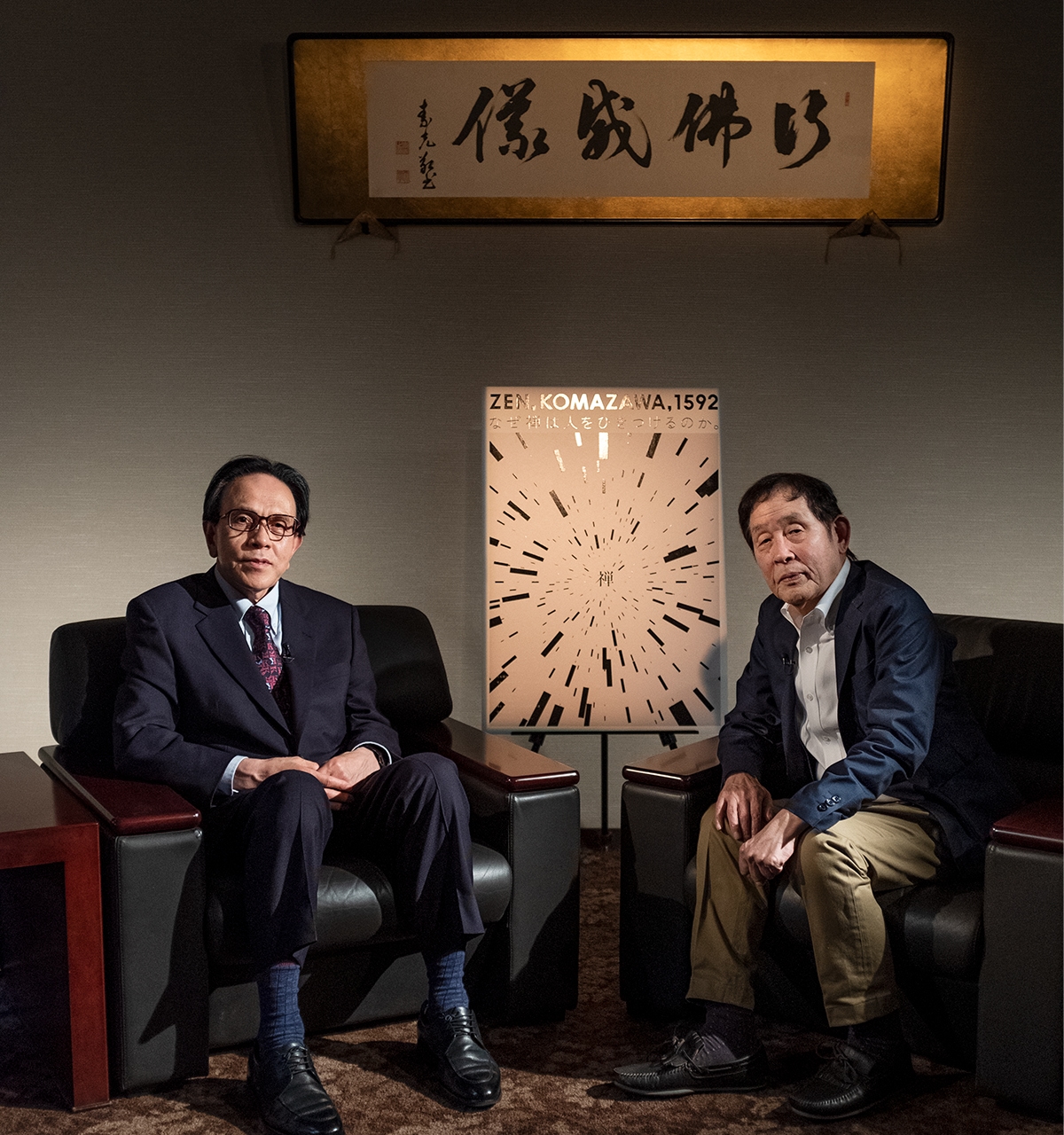
ZEN, KOMAZAWA, HUMOR
To encounter the magnificent words of Buddhism, comedian Kinichi Hagimoto, who enrolled at Komazawa University in 2015, talked with University President Hasebe about “Zen, Komazawa, and Humor.” Hagimoto looks back on his 4 years of “the happiest university life possible” while reflecting on the university president’s phrase, “betray everyone (in a good way).” Conversation topics include Hagimoto’s first encounter with Zen, words the university president will never forget, graduation, and unexpected reunions.
An Unforgettable Dialog From Komazawa
Hasebe:Hello, Kin-chan, it’s been a while.
Hagimoto:It certainly has! We haven’t seen much of each other since you became university president, have we?
Hasebe:That’s true.
Hagimoto:Since the very first time I came to Komazawa [University].
Hasebe:You remember those days?
Hagimoto:I do. When I first came to Komazawa—after I passed the entrance examination, I wanted to come to the university and have a bit of a chat—the first person I talked to was you, Prof. Hasebe. And you know what? I thought to myself, “Kin-chan, it’s a good thing that you came to Komazawa.” You said that it seemed teachers were concerned about whether I would actually be attending classes to study.
Hasebe:That’s right.
Hagimoto:I said, “Oh, everyone probably thinks I’m going to muck around.” And then you said, “Kin-chan, let’s defy their expectations.” What a great line! And then of course I said, “Sure, whatever you say,” and got up to leave, but you said, “Kin-chan, wait a minute.” And I said, “Yes, what is it?” Then you pointed your finger at me and you said, “From now on, I’m training you!” And that was your last line. What a great line! I’ll never forget it.
Hasebe:I clearly remember saying that, too.
Hagimoto:That last, “I’m training you.”
Hasebe:Naturally, I wanted to train you. That time, that moment, when we first met, my first impression was that it would be worthwhile to train you. And what that means is, the famous Kinichi Hagimoto, who plays an active role out in the world—well, in the world of comedy, he is already top class. And the fact that someone who has amassed such tremendous popularity has enrolled in Komazawa University’s Faculty of Buddhism could be interpreted many ways by the general public. Pardon me for saying this as it’s a bit disrespectful to you, but I think that there were probably people who viewed your enrollment as—how can I put it?—a means of drumming up publicity. However, that time when we first met, one thing that I strongly felt was, “This person is serious.” And so I wanted to test how serious you actually were, and I expressed this desire in the phrase “I’m training you.”
Hagimoto:In my own life, whenever I think, “Hey, there’s something that I really like about this person,” and after I’ve listened to what they have to say, things in my life go extremely well. I felt this really strongly with you, Prof. Hasebe, and so I never missed even one day of classes during my four years of study at Komazawa University.
Hasebe:Yes, that was a tremendous effort. I think you deserve praise for that more than anything else—continuing requires strength.
Hagimoto:It’s because I liked my teacher.
Hasebe:Why, thank you!
Hagimoto:If I broke my promise to you … I didn’t want to break my promise to you.
Why I Joined the Faculty of Buddism
Hasebe:By the way, Kin-chan, what made you decide to enroll in the Faculty of Buddhism in the first place?
Hagimoto:Well, I read the characters for “Buddhism” as “the teachings of Buddha.” Since Buddhism is the teachings of Buddha, I thought it must have something good to say, and so I thought I would go and meet these wonderful words.
Hasebe:In that case, at the time that you were considering enrolling, what did you think about the connection between a world that influences the minds of the people—that is, the world of comedy, the entertainment word—and the teachings of Buddhism? Did you think, “If I enroll, I’ll probably be able to do such-and-such. What I learn will probably relate to my life so far in such-and-such a way”?
Hagimoto:Initially there wasn’t much of a connection. I thought Buddhism being so incredibly serious, needing such resolve—that was a very long way away from the world of comedy. But it had already been four years since I started Buddhism, and during these four years I have met various different teachers. And I said to one teacher, “About Buddhism and Zen”—from the third year of the course, Buddhism and Zen studies are separate courses and students are free to choose whichever course they prefer—I said, “About Buddhism and Zen, I don’t know which one I should choose. Which is more interesting, Zen or Buddhism?” And the teacher replied, “Zen.” He was very clear about it. And I said, “Why?” And he said, “Buddhism has a long history. In historical terms, Zen is only just starting. There is so much packed into Zen’s short history, and so Zen is deeper and more interesting.” I wish I had met that teacher when I was in the second year. He did say that it was a pity that we hadn’t met earlier. Anyway, so I took this teacher’s course, and the fascination of Zen—that is to say, comedy became just a bit more interesting, and I said this to my Zen teacher. I said, “None of the classes have a punchline, but there are the Zen Analects, and so when you’re talking about Zen, could you possibly end the classes with a punchline?” After that, the teacher ended all our classes with a Zen punchline, and Zen became really fascinating. I think it would be pretty rare to find a teacher outside the Faculty of Buddhism who would actually listen to what a student has to say. There’s a willingness to remark ad-lib when interacting with students.
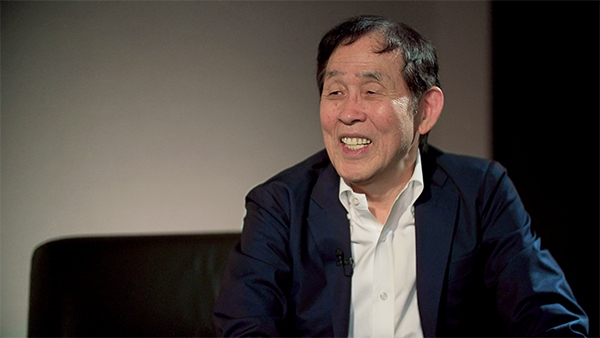
Common Points Between Zen and Humor
Hasebe:Today’s theme, the theme we are talking about now, is “Zen, Komazawa, Humor.” Zen and Buddhism and humor. Kin-chan, what—if anything—do you think these have in common?
Hagimoto:Well, first of all, I asked lots of people, “What is Zen?” and I was surprised by that fact that everybody gave me a different answer. And so I didn’t have a very clear idea of what on earth Zen actually was, everybody said something different.
One day recently, as I was asking lots of questions like this, a teacher gave me the best answer. He said, “You did it on television.” And then he explained to me that Zen is doing what you ordinarily do to the absolute best of your ability. I asked, “Are those the best words in Zen? Who said them? He said, “You said them yourself, you said them on television.” Am I getting it right, Prof. Hasebe?
Hasebe:I think in a sense, you’ve hit the nail on the head.
Hagimoto:Really?
Hasebe:But I think humor, I think it’s a bit strange for someone who is a superstar in the world of comedy to say such a thing. It’s difficult…. That is to say, if someone asked, “What is humor?” it would be very difficult for someone like me to answer them because the world of Zen—to my way of thinking, at least—is very witty, or resourceful, don’t you think? There are many phenomena in the world of Zen that equate with this wittiness or resourcefulness. This is not a kind of humor that invites you to roar laughing like the comic story telling in Rakugo; rather it makes you nod in agreement and smirk or giggle quietly. And so if you expand your thinking regarding humor to this level, this wittiness or resourcefulness definitely is a form of humor. However, I do think wit is actually included in humor, don’t you agree? Wit. So, Zen is full of wit, or resourcefulness, the wit of [the iconoclastic Japanese Zen Buddhist monk and poet] Ikkyu. Humor that makes you think, “Oh, I see, that’s how you think—how intriguing!” That’s the part that I find so fascinating about Zen. There are many, many Zen words and phrases that include this kind of humor. And so it’s not this big loud punchline but more like the sound of a penny dropping—it’s this part that makes you smirk and giggle.
Hagimoto:And so, it’s this relationship between Buddhism and this humor-like aspect. Sometimes I tell my teacher that from my perspective, we could laugh just a little bit more, I say various things to him. I really liked the principle of jimitokudosendota (allowing someone else to obtain something before you yourself do). We had a class on the theme of allowing other people to board a boat before you. It’s wonderful, isn’t it? Instead of you yourself boarding the boat, you allow another person to board first. I said to my teacher, “Yes, it’s a wonderful story, but what if the other person also knows the principle of jimitokudosendota?” You say, “Please, after you,” then the other person insists, “No, please, after you!” The other person also knows jimitokudosendota and then you are both saying, “Please, after you!” I said, “If that happens, neither of you will be able to board the boat!” In reply, my teacher said, “That’s a very pertinent point. Nobody has ever asked me that during a class before, so I don’t have an answer prepared.” This is another way that this teacher is kind of humorous or witty. So I said, “Oh, OK.” And there just happened to be a Buddhist monk there, and so my teacher said to the monk, “Hey, monk, haven’t you got any ideas?” And the monk said, “If someone said, ‘Please, board the boat before me,’ wouldn’t it be tokudosendotai to simply say ‘Thank you’?” And my teacher said, “That’s right. Kin-chan, saying ‘thank you’ is also jimitokudosendota, that entire conversation is Buddhist!” I got the feeling that this teacher was also joining in the small joke somehow.
"Sadhana" in the worlds of Zen and Art
Hasebe:Certainly that can happen in classroom situations, but Buddhist monks undergoing Zen training … the way these monks are has created the history of Zen, and for Zen Buddhist monks,, it really is said that living a daily life itself is an exercise.
That is, the teachers do not necessarily place the monks in a situation where one day they are told, “OK, today you start your religious training.” Rather, when the monks’ normal everyday lives, their—how can I say it?—their demeanor and behavior, are in themselves training, the monks gradually cultivate awareness within their everyday lives that they as one person are being allowed to live within their own situation, and that within this situation, they must better themselves step by step. For this reason, their training is the extent of their experience in everyday life. That is to say, their experiences in daily life contribute to their training. So in this sense, Zen training is exceedingly singular, or rather distinctive. For this reason, when I see monks, trainees, and Buddhists—and this applies to you teacher as well—I see a lack of arrogance. Their actual everyday manner and way of speaking, their demeanor and behavior, all clearly show and make you ponder various things. Recently I’ve really begun thinking that the entertainment world, entertainment, for example, truly is Zen training in a sense. Through gradually coming to realize through experience what laughter is authentic as you undertake this training with all your heart—the mutual clashing of experience against experience—I think it is very easy to sense commonalities between Zen and entertainment, especially for someone like you, Kin-chan, who has cultivated themselves as an artist.
Hagimoto:When I came to Komazawa University, I thought to myself, “I’m glad I came to this university.” The first word I heard that made me feel glad to have joined the Faculty of Buddhism, and the word that I’ve been hearing all this time, is “training.” That’s what everyone keeps saying. You never hear anyone say, “Study!”—everyone says, “Train!” When you think carefully about it, my teacher in the world of comedy also said, “Train!” The reason television is becoming so boring now is that everyone is studying, but there is another world, the world of training. In other words, the answer to what training is, is not something that is taught but rather something that is intuitive. Achieving enlightenment is something you do for yourself, right? That is, you don’t learn by being taught but rather by closely watching and following your teacher. During these four years at
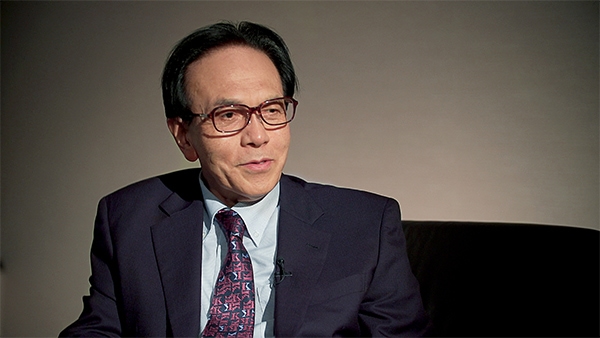
An Unexpected Reunion
Hagimoto:Actually, I was told something along the same lines myself, at Komazawa, after I came to Komazawa University. One incident that made me glad to have come, not to the Faculty of Buddhism specifically but to Komazawa University, occurred with a university administrative staff member who apparently said that they really, really wanted to meet Kin-chan, begging my professor to allow them to do so, and they came to see me before my class. This person said, “I have come to see Kin-chan because I want to thank him.” I asked, “Why on earth do you want to thank me?” They said that they had been in the audience of a public broadcasting program that I was appearing in decades ago, and as they were watching the broadcast, the person’s parents had been talking about splitting up. At that moment, there had been a huge close up of the person laughing in the audience, watching Kin-chan and roaring with laughter. The person’s parents were watching this at home, and the mother said to the father, “You know, we’re here talking about splitting up, but look at that television screen! Let’s not do something that would wipe the smile off that child’s face.” When the person thanked me for saving their parents’ marriage, I thought, “Oh, I’ve been performing on television for a long time, but I’ve never felt glad to be on television.” Something I was always saying about being glad to be on television, doing comedy—this is not something that is necessary in the world, at the most it might make the world a bit brighter, but I never thought that what I was doing was benefitting other people. It was after I came to Komazawa University that I heard this wonderful story, and so that’s another reason why I’m so glad to have come to Komazawa University.
Hasebe:Is that something that you would like to convey to students?
Hagimoto:Well, I’d say that there are a lot of people like that at Komazawa University, so you should come to Komazawa. There’s me and quite a lot of other students who are quiet and gentle by nature. If you try talking to various people, you can encounter many different lives. Even me, when I first came here, I talked to you—even though now you’re the university president—and we talked about various things, and we had a really good talk. One more thing—this is a bit of a complaint about you, actually—in your class, I was a bit interested in seeing you say something strict to students, so when a student was presenting their graduation thesis, I raised my hand and I said to you, “Prof. Hasebe, could you please tell us the good and bad points of the thesis that was just presented?” And you replied, “There were no bad points.” You talked about the paper’s good points. You’re the kind of person who will not be critical of something, no matter how hard you are pushed. Why is that?
Hasebe:Well….
Hagimoto:So is it because of Buddhist teachings? Is it because of Zen teachings? Is it something that your parents taught you? You absolutely never criticize anything.
Hasebe:Well, within my educational perspective, I believe that never being critical is actually the strictest form of guidance.
Hagimoto:That’s deep. That is a very deep thing to say. Strict guidance.
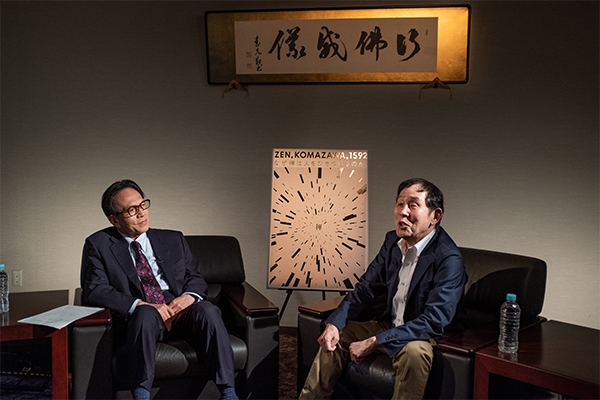
What is the Strictest Guidance?
Hasebe:Identifying and thinking about your weak points for yourself. Anybody can fix problems that someone else has pointed out to them, but it needs to be a relationship in which the person doing the critiquing truly knows that person and is able to say what the core of the matter is when pointing out problems. For example, in a truly superficial encounter, pointing out problems looking just at academic aspects cannot necessarily be said to be an appropriate approach when studying Buddhism or religion in general. You have to look at the way that person is living life. In your case, Kin-chan, I think that in the way that you are living your life, there is a part that called you, or drew you, to come to Komazawa University in the way that you have. And so precisely because I know and understand this relationship—even though I don’t make such requests of you, and I am not even in the position to make such requests of you. For students, however, I think anyone can comprehend what their being praised about, but the most difficult thing to do is to not point out problems when asked what the problem points are.
Hagimoto:There you go with another of your one-liners! So now, whether it’s work or baseball or sports or whatever, you don’t immediately tell a person “Do this” or “Do that” but rather let them think it out for themselves?
Hasebe:Providing every possible assistance.
Hagimoto:So it really is training. Realizing something for yourself is training.
Hasebe:It’s independence and autonomy.
Hagimoto:But Prof. Hasebe, that’s just brilliant. And it’s also wonderful that it is also the strictest form of guidance.
Hasebe:But I think it was you, Kin-chan, who thought it was strict.
Hagimoto:For those of you who are thinking about becoming students at Komazawa University from this year, the application ratio for the Faculty of Buddhism is increasing, so you should be careful. By the way, you probably don’t know that Prof. Hasebe is very popular with students.
Hasebe:You exaggerate.
Hagimoto:See, there you go. This is Prof. Hasebe’s appeal.
Hasebe:As you know, Kin-chan, I’m always saying, “Students First,” and all the university staff are working together as one to implement this policy. And so I regard this event as being a part of that, but what is important is that “Students First” cannot simply be about welcoming students. Rather, it is essential that we encourage students’ sense of independence and autonomy, drawing out such mindsets and strengths from within them. If there is nothing that students need to think deeply about, they cannot develop independence. And so that is what I mean when I talk about “Students First.”
Hagimoto:You’re talking about “Students First,” but I think it comes down to the lecturers. Why doesn’t the lecturer say something is bad? Because not critiquing is actually the strictest form of guidance. That’s an amazing thing to say.
Hasebe:You think so?
Hagimoto:Normally you wouldn’t get such a kind response—in fact, you would get just the opposite. Some would say that other responses are stricter.
Aim for the future: Life Long Learning
Hasebe:That’s why it’s important to never lose your desire to improve yourself. There is no such thing as “Things are fine as they are.” And so, to use a Zen saying, even if you reach the tip of a 100-shaku (30.3 m) long kanto pole, go one step further. Let’s go one step further. This is expressed in the phrase Hyakushaku kanto ni ippo o susumu (“Even though one has reached great heights of success, one should still strive to improve oneself”). And so in the world of Buddhism, if arriving—that is, enlightenment—is reaching the tip of the pole, you must not be satisfied with that. You must strive to go beyond the tip of the pole. So what is beyond the tip of the pole? Ultimately, taking a step further means improving yourself and taking a turn from the situation, the circumstances, of having drawn closer to the world of Buddha and turning your eyes to the world of the people—if you’re a student, the world of students—to the world of ordinary people, and acting for their benefit. If you do that, Kin-chan, as I was saying before, you are in the world of altruism. Thinking of others. If you are able to turn yourself in the direction of thinking about other people’s worlds, you have taken a step forward. For enlightened people to go beyond the tip of the pole ultimately means providing their strength and capabilities or whatever they have accumulated for the benefit of ordinary people moving forward. And so this is the spirit of Zen.
Hagimoto:Remember when I was in the first year and I wanted to run away from all my exams; that is, the weekly magazines were using me as fodder quite a lot, reporting that I’d said that if it was a choice between winning and running, I’d run. So when my teacher said that exams would be the next week, I tried to go home, but my teacher said, “Kin-chan, wait! Are you running away?” And I said, “Of course I am.” Then my teacher said, “Wait. Don’t run away. What you’re doing isn’t so difficult. Really, it’s not. But you won’t be satisfied knowing just one thing. You won’t be satisfied unless you understand everything.”
Hasebe:So that’s what happened.
Hagimoto:But actually, I’d thought about playing the role of a bad student just a tiny bit. I wondered how the university would handle me if I did that. I thought a fool would be treated like a fool, but in fact my Buddhism teachers were very kind. They all said to me, “Wait a minute. Don’t throw everything away!” And then I thought, “OK, I’m going to study.” I decided, if these people are so concerned, then I have to study and get scores of 30, 50, 70, 80. Ordinarily teachers wouldn’t say, “Wait a minute.”
Hasebe:No, they wouldn’t.
Hagimoto:It’s that kind of environment, it’s that kind of human relationship that made me want to study. Thank you truly for these four years at Komazawa.
Hasebe:You’re truly welcome.
Hagimoto:I’ve had the most wonderful student life.
Hasebe:Well I, or rather the university, also want to say thank you to you, Kin-chan. The reason is also the theme of our chat today—humor. The world of Zen and humor don’t always have an image of being connected. But I believe that it’s thanks to you, Kinichi Hagimoto—Kin-chan—that it has become possible for people to feel such a sense of familiarity with Zen. In your performances, the humor isn’t simply about making people laugh; it makes people think as well. As far as I can see, that’s what you are doing when you are performing, Kin-chan. You really think your act through. What words to use in a particular situation, what kind of act to present—when I see you, I can’t help thinking how thoroughly you must think about what you’re doing. It’s like you’re improvising but not actually improvising. I think what you do is brilliant, and it shows that you regard comedy as a form of spiritual training. You’re not just a comedic genius.
The Charm of Zen and Comedy
Hagimoto:When I was writing my graduation thesis, Prof. Hasebe you told me that I had to write about humor in my thesis, that you were waiting for a thesis that could discuss Buddhism with sophisticated humor. Then you just left me to it! That was a really difficult topic you gave me. But I am tremendously grateful that you mentioned comedy.
Hasebe:There’s an element of pathos, too. That ability to evoke emotions, or make people nod in agreement, I think that is the Kin-chan style, the Kin-chan characteristic. And so, I feel that somewhere in what you do there is a desire to incorporate various elements into not only the punchline, but also in the background story that make people think, and in a sense, save them. This logic of salvation or thinking underlies your comedic performances, and I believe that is why people are so drawn by your words. I think Zen is like that, too. It is precisely because there is an underlying spirit of benevolence that wisdom is born, and this cannot be achieved through knowledge alone. For knowledge to become wisdom, the flip side is a spirit of benevolence. Making people feel this way—without this element, people will not follow. And Kin-chan, you have been playing and continue to play the role of a messenger, of an evangelist, who effectively conveys to us how the appeal of Zen and the appeal of comedy have common elements.
Hagimoto:Just being able to hear talk like this about Zen is fascinating. It’s good to be able to meet a diversity of teachers, I think.
Hasebe:I agree.
Hagimoto:I realize you must be busy, but if possible, it would be wonderful if you could present some more lectures, perhaps during the summer break.
Hasebe:That’s a good idea. I’ll think about it.
Hagimoto:Thank you very much, Prof. Hasebe.
Hasebe:Thank you very much, Kin-chan.
Kinichi Hagimoto
4th–year student, Komazawa University, Faculty of Buddhism
One of Japan’s foremost comedians, emcees, and directors. In 2015, he entered Komazawa University’s Faculty of Buddhism as a new student, and is currently enrolled there. His writings about his university life include “Kin-chan no, Boku wa Bokenai Daigakusei. 73-sai kara no Chosen” (2016, Bungeishunju).
Hachiro Hasebe
President, Komazawa University
Professor, Department of Buddhist Studies, Faculty of Buddhism, Komazawa University
Professor at Komazawa University’s Department of Buddhist Studies. Komazawa University President since 2016. Researches the role and function of religion in society, particularly Buddhism, from theoretical and practical approaches. Writings include “Kitō Girei no Sekai - Kami to Hotoke no Minzokushi” (1992, Meicho Publishing).
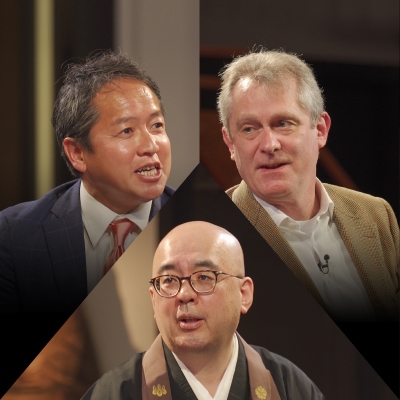
SPECIAL
ZEN,KOMAZAWA,MANAGEMENT
For our 5th discussion in this series we welcomed guest participant Mr. David Atkinson, CEO of Konishi Decorative Arts and Crafts, for a three-way dis・・・
2020.08.07
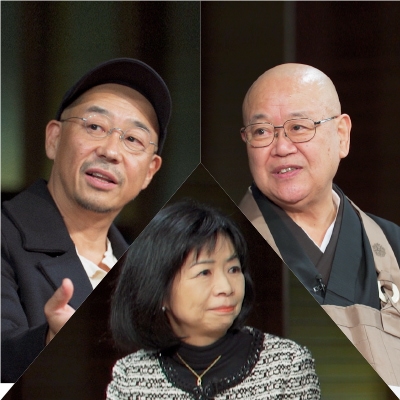
SPECIAL
ZEN,KOMAZAWA,MOVIE
For our fourth interview we welcomed film director Tatsushi Ōmori as our guest, and together with Komazawa University Chancellor Seishi Nagai and Prof・・・
2020.03.05

